The day the universe conspired for Lucas Radebe’s dreams
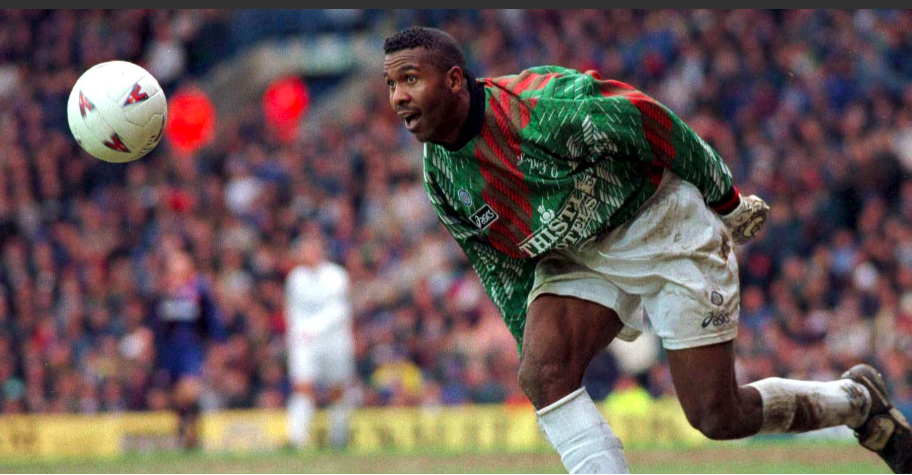
After weeks of telephonic conversations planning to meet with the man who unearthed the outstanding talent of Lucas Radebe – Siegfried ‘Bra Zieg’ Hlongwa – we finally take that long drive to Zeerust.
Even heavy rains could not stop us from taking this much-awaited trip on that beautiful Wednesday morning. Of course, we had spoken to Hlongwa over the phone about how he discovered Rhoo, but there’s a collective urge to meet with the man and hear it ‘live and direct’.
It’s 9 AM, and we arrive at Wimpy in Zeerust. Hlongwa is undoubtedly one to keep time as a headmaster, so the editor Tiyani wa ka Mabasa and myself (Mthokozisi Dube) find him waiting right at the Wimpy door.
We humbly exchange pleasantries while waiting for our breakfast and waste no time as we dive into a heart-to-heart about the day destiny had its hands on the legendary Lucas Radebe.
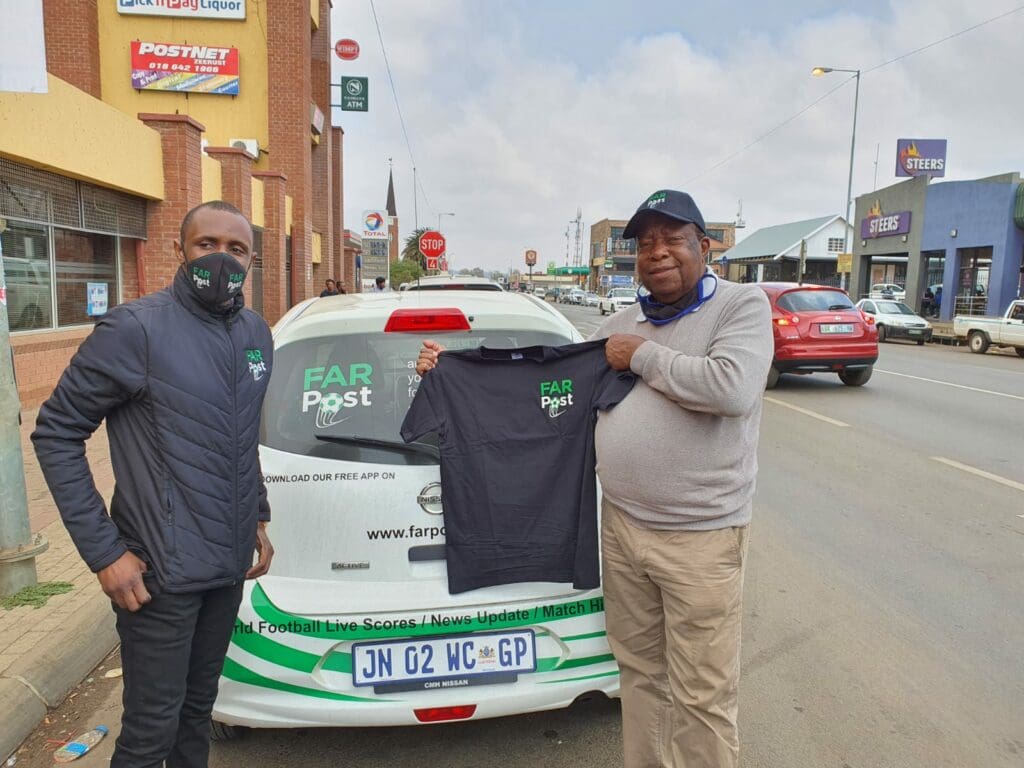
From our talk with Hlongwa, all the boy needed was a chance! That one opportunity of a lifetime. As we learn from this fatherly figure, the rehashed lesson is that sometimes it comes in the flukiest of ways.
His story, whose leading actor is Lucas Radebe, is testament to that.
Interestingly Rhoo, who knew about our trip, had already told us that his late mother, Emily Radebe, once told him something peculiar about him when he was born on 12 April 1969.
But then, the momentous day was just another typical Saturday in 1986. Nothing spectacular. Nothing anticipated. But destiny had other ideas for this young Diepkloof lad.
An unexpected guest in the form of the headmaster of Ngotwane High School, Hlongwa, arrived at his Soweto home around 9AM. Ngotwane was in the Republic of Bophuthatswana; a territory declared independent by the apartheid regime in 1977.
The man he was after was Rhoo’s elder brother – Abraham ‘Siga’ Radebe – a gifted midfield maestro. “They had not come for me; they wanted my brother, who was more talented than I was. He could have easily walked into any top club,” Radebe tells FARPost in a telephonic interview.
But as fate would have it, Siga, known for his love for the brown bottle, was not at home. No one knew where he was, but what was certain was that he would return pie-eyed after a few drinks.
Desperate to get this highly recommended young midfielder to Mmabatho, the capital of Bophuthatswana, Hlongwa reiterates how he had to endure the long wait.
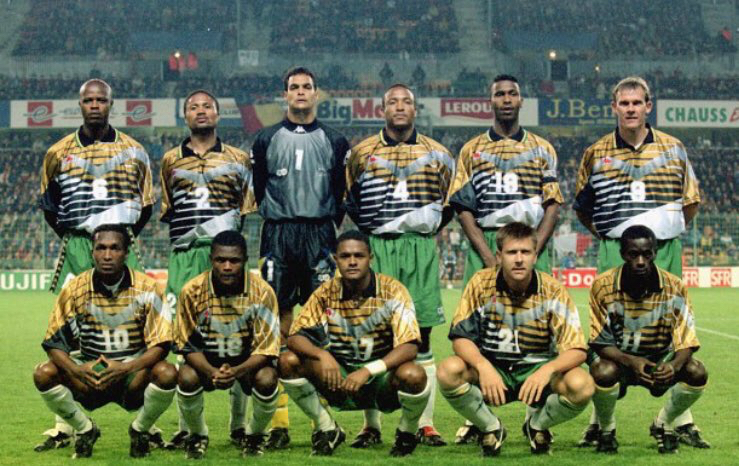
The idea was to get Siga, who passed on at the age of 57 three years ago, to enrol at Ngotwane while also playing for a Lehurutse-based club run by Hlongwa, ICL Birds. They competed in the Bophuthatswana Soccer League.
The longer they waited, the more awkward it became. At about 2PM, an edgy Emily Radebe suggested they take her younger son, Lucas Radebe. Oddly, the younger boy, aged 16 then, was a goalkeeper. He was not the kind of player they were looking for. The club already had two talented shot-stoppers in its books.
“A goalkeeper is the last thing we wanted then, but his mother insisted we take Lucas because his brother was likely to give us problems because of his love for alcohol. But still, it never made sense to take a goalkeeper we had never watched,” Hlongwa says as he sips his coffee.
Reluctantly, he agreed to take this young boy. In the back of his mind, he would use this boy as bait to return for his elder brother. In any case, it would make sense to have both siblings at Birds.
But Bra Zieg was about to get the shock of his life. He had accidentally unearthed the most talented and versatile fellow to ever don the Birds jersey. He had South Africa’s brightest football prospect on his hands.
“After watching him, I said to him, ‘I think you’ll do well in midfield’. He agreed to play in midfield, and he was fantastic. So, he would occasionally switch to defence. He was good wherever we played him,” says Hlongwa, adding that they never bothered to look for the brother again.
In midfield, Hlongwa says, the boy would turn into a remarkable, bodacious anchor-man who effortlessly dictated terms in the middle of the park. The teenage starlet switched to central defence with so much ease, where he would thwart any opposition threat in any way the situation demanded. Sometimes he man-marked the most lethal, older strikers into silence.
It came as no surprise when he caught the eye of Glamour Boys legend Sylvester ‘City’ Kole. The former Amakhosi defender did not waste time, immediately alerting club supremo Kaizer Motaung of this rare gem. The Soweto giants began to track the then-teenager.
Fascinatingly though, when Patrick ‘Ace’ Ntsoelengoe attended one of his matches, Radebe was in between the sticks and saved two penalties. “I was one of the best goalkeepers, I represented Bophuthatswana as a goalkeeper, and we played against South Africa,” Radebe recalls.
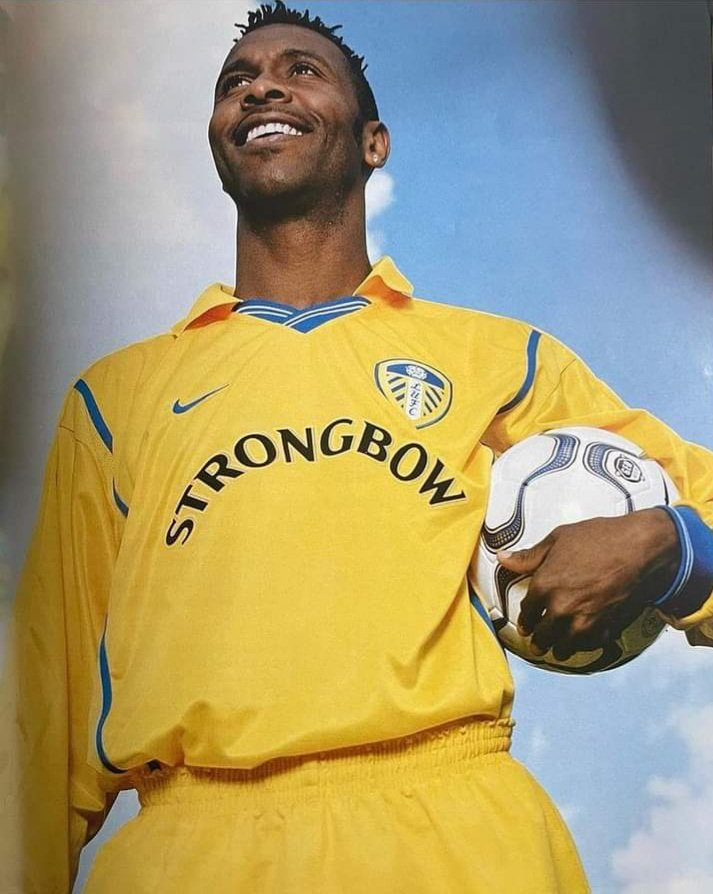
The two clubs then agreed on terms, and a compensation fee of R16 000 was paid to Birds.
“We had wanted R20 000, but we settled for R16 000,” Hlongwa, who is 72, explains.
Rhoo became part of one of the most successful generations of Amakhosi in the early ‘90s. Of course, his progress was hampered when he was shot in the hip while driving to shop for his family in 1991.
“Luckily, the bullet missed organs that would have prevented me from continuing playing although I needed surgery to overcome the injury,” the former national team stalwart says.
In 1994, the universe conspired yet again for the most significant breakthrough of his life. English Premier League side Leeds United desperately wanted to sign his former Bafana teammate, the late Philemon ‘Chippa’ Masinga, from Mamelodi Sundowns.
“When they came to fetch Phil, they asked about me because someone had told them about me. Unfortunately, they couldn’t watch me play because I was injured. But it was later decided that I also move to help Phil settle at Leeds,” he explains.
Off he went to Yorkshire in 1994. However, he struggled to adapt to life in England. The weather was different from what he was used to, and he was getting homesick. For all his talent, he had started just one match in four months and made a few brief appearances as a substitute. It frustrated him so much.
Shortly before Christmas of that year, he had his bags packed, an airline ticket in his pocket and was ready to escape from Leeds and fly back to Johannesburg secretly.
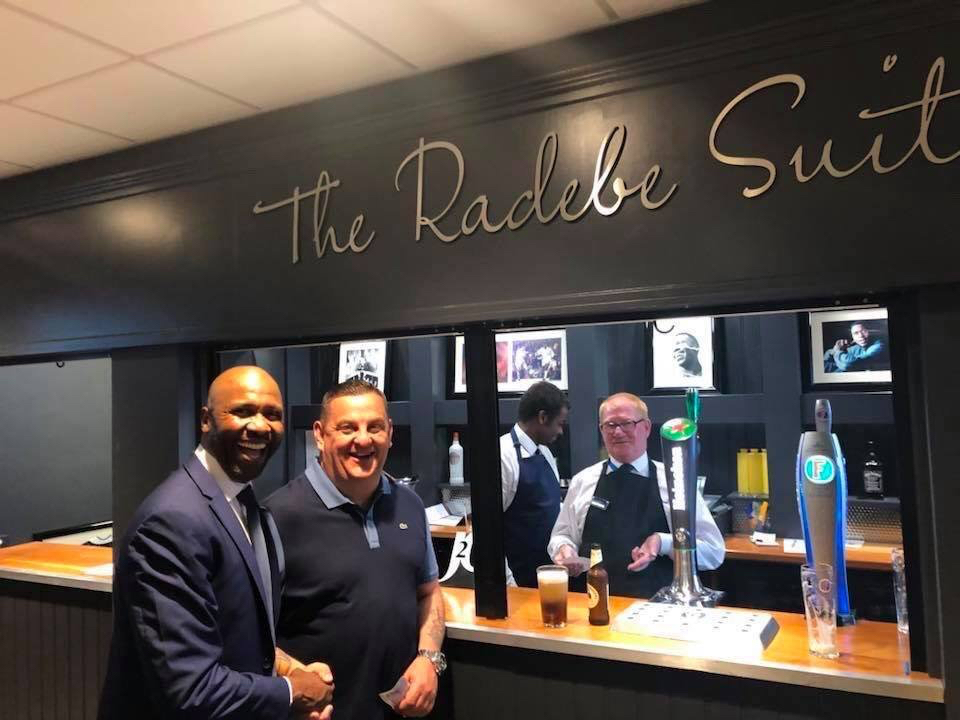
“I thought, ‘my bags are packed, I’ve got my ticket, I am just going to go’. I wasn’t going to tell anybody,” he says.
Nonetheless, he came back to his senses and made what was seemingly the best decision of his life. He took his hand off the doorknob and stayed.
Another blow was to come his way in a game against Peter Ndlovu’s Coventry City in 1995. He had to be stretchered off the pitch with ruptured ligaments on his knee, and not many people believed he would ever play football again.
But ‘The Chief’ fought back to a remarkable recovery towards the end of 1995. Just in the nick of time! He sneaked into the Bafana squad for the historic ‘96 AFCON hosted on home soil. There was no way he’d miss that one. Rhoo wanted to be part of history, which was evident enough in the few cameo appearances he made after the dramatic recovery.
“It was a career-threatening injury, but I was able to come back. When I look back, I believe everything that happened was for a reason. I was meant to be who I am,” he says authoritatively.
Understandably, The Peacocks were not happy with Bafana coach Clive Barker’s decision. They thought it was a bad idea for Radebe to be included in the AFCON squad. It took a meeting between Barker and Leeds coach Howard Wilkinson for Rhoo to be allowed to join his national teammates for the camp.
Bafana would be crowned champions of Africa at the end of the tournament, with Radebe – one of Africa’s best-loved footballers – proudly returning to Yorkshire with a gold AFCON medal.
In April of that year, Rhoo got a chance to relive his goalkeeping days when he was handed the gloves at Old Trafford against a title-chasing Manchester United side at their fortress Old Trafford.
Radebe began the match on the bench when Mark Beeney handled the ball outside of his 18-yard area, and referee Keith Cooper had no option but to send him off. Wilkinson had travelled to Old Trafford without a substitute goalie after dropping John Lukic from the match-day squad entirely because of a poor run of form that had seen Leeds lose 6 of their last seven games. His only option at that point was to bring The Chief on as an emergency sub.
“I was on the bench as a sub, and suddenly a jersey and pair of gloves was thrown at me,” recalls Radebe, who put in one of the best performances by a makeshift goalie that English football has ever seen.
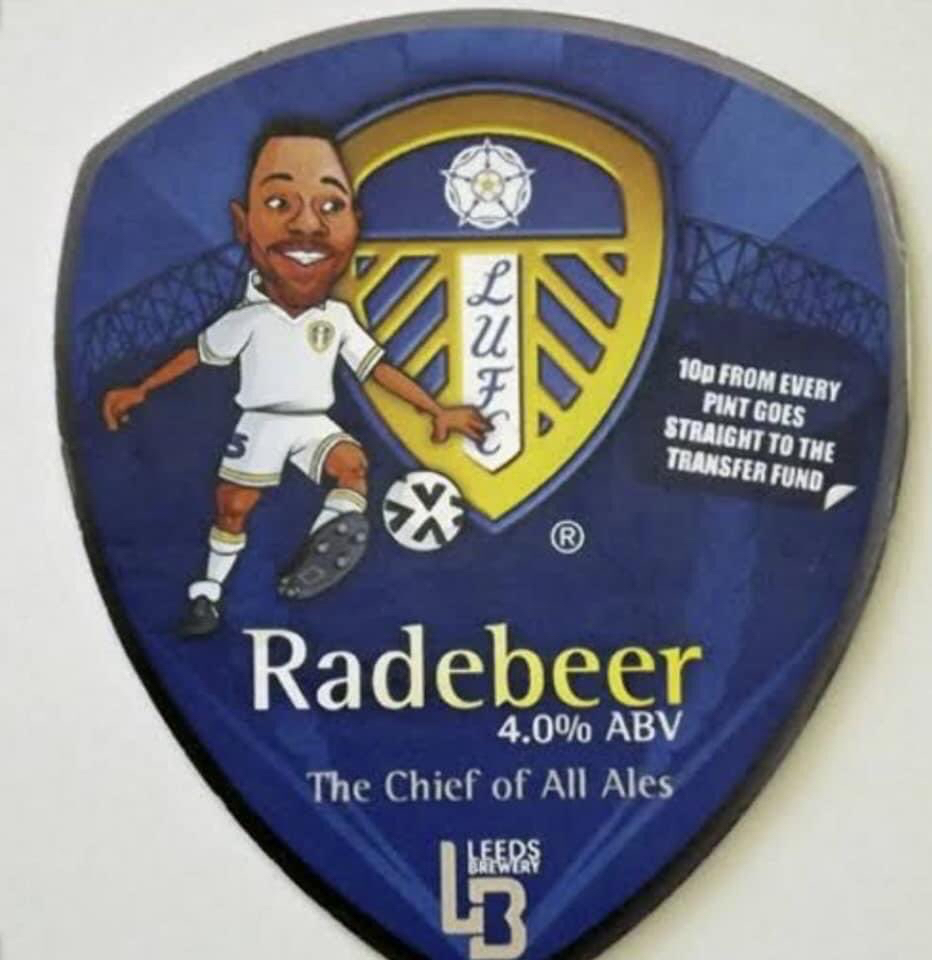
The former Bafana captain pulled off excellent saves from Ryan Giggs, Brian McClair and Andy Cole as the travelling Leeds fans began to believe that their 10-man side could claim a famous point at the home of their most bitter rivals in the most trying of circumstances. Alas, Radebe’s luck ran out in the 73rd minute.
Former Leeds man Eric Cantona found Roy Keane on the edge of Radebe’s area and fired a low shot past him to give the hosts a 1-0 lead, which they saw out.
“We weren’t surprised when we heard that he played as a goalkeeper against Manchester United. He had grown up playing that position, and he always did it so well,” says Hlongwa.
That grand gesture from Radebe is perhaps what made Leeds United fans fall in love with him more. “Sir Alex Ferguson came and congratulated me after the game. Even the referee congratulated me, and I think Leeds fans will hold that gesture dearly and close to their hearts,” adds Radebe, who made 235 appearances.
A Twitter exchange in August 2019 revealed that ‘Lucas’ continues to be one of the most popular boys’ names in Leeds, with several supporters getting in touch after Radebe responded to one fan who had named his son after the former skipper.
“I had known about horses and cats being named after me during my time at Leeds, but after my testimonial match, people started coming up and telling me they were naming their kids after me. It’s very kind of them,” he says modestly.
But beyond his cult status at Elland Road, Radebe became a Premier League icon who transcended club loyalty thanks to his wholehearted performances and unwavering commitment to the cause. After rejecting an approach to join Man U, having become captain of the vibrant Leeds side, which reached the last four of the Champions League in 2001, Radebe’s influence extended way beyond the pitch.
When it was time for his testimonial on 2 May 2005, nearly 38 000 supporters crammed into Elland Road to bid farewell to one of Leeds United’s most iconic players.
“I grew with the club and became a Yorkshire man; the relationship is still ongoing. The relationship is still brilliant. I have no regrets turning down Manchester United. Lazio and Roma came, but I felt I belonged to Leeds,” says the revered Radebe, who became the club’s skipper at the start of the 1998/99 season.
The Kaiser Chiefs rock band was christened to recognise his former club to add to his honours. Without a doubt, he remains the epitome of loyalty, but it was all thanks to the universe conspiring to propel him to stardom and cult status both at home in Yorkshire.